Is Your Factory Tint Putting You At Risk For Skin Cancer?
Recent studies have shown a direct relationship between drivers and skin cancer. Research from The Bureau of Labor Statistics suggests that the average American will spend approximately 37,935 hours (4 years) of their life driving and studies by The Skin Cancer Foundation report that 2 million people are diagnosed with skin cancer every year with 74% of all non-invasive melanoma skin cancer cases found on the driver’s side of the body.
So Where Does “Factory Tint” Come In?
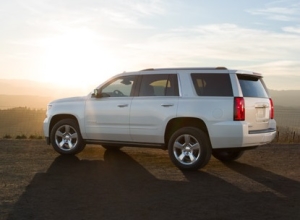
SUV with Factory Tint
Factory tint, seemingly similar in looks to window film, doesn’t provide the same protective features that window film provides. In the early 2000’s, car manufacturers started including factory installed privacy glass on the rear half of vehicles, known as “factory tint.” This gives consumers a false sense of the protection from UV Rays. The main purpose of privacy glass is self-explanatory; it provides privacy for your passengers, but unfortunately not much else.
Many car owners think that since their side and back windows are already “tinted,” all they have to do is get the front windows and windshield tinted, but there is a big difference between factory tint and window film that could impact the health and wellness of car owners and riders.
Sun Damage Dangers
You may have heard the story that surfaced back in 2011 about the 66 year old truck driver with severe sun damage on the left side of his face. Bill McElligott had been a truck driver for about 30 years when this picture was taken.
Dr. Jennifer Gordon, the dermatologist who treated Mr. McElligott, explained that the extensive amount of time Mr. McElligott spent driving had exposed him to the harmful UVA rays that penetrate glass and cause photo-aging.
“We are used to seeing photo damage by the sun every day, but I was taken aback when I saw how one-sided this was,” said Dr. Gordon.
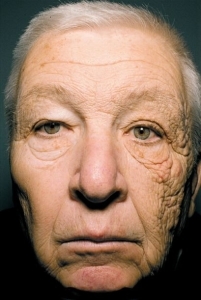
Bill McElligott with sun damage from 30+ years of truck driving.
Factory Tint vs. Window Film
“Factory tint” isn’t actually window film; it’s created using a dye on the inside of the glass, giving it a darkened look and preventing a percentage of visual light from passing through. This electrical process is referred to as “deep dipping” and doesn’t protect against the Ultraviolet rays that are harmful to your skin.
Factory Tint
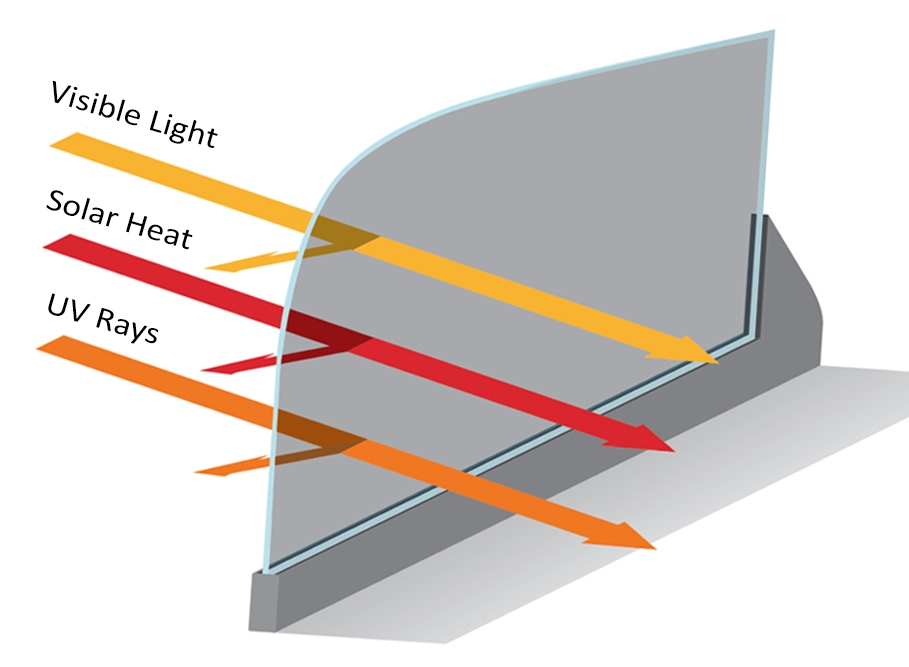
Window Film
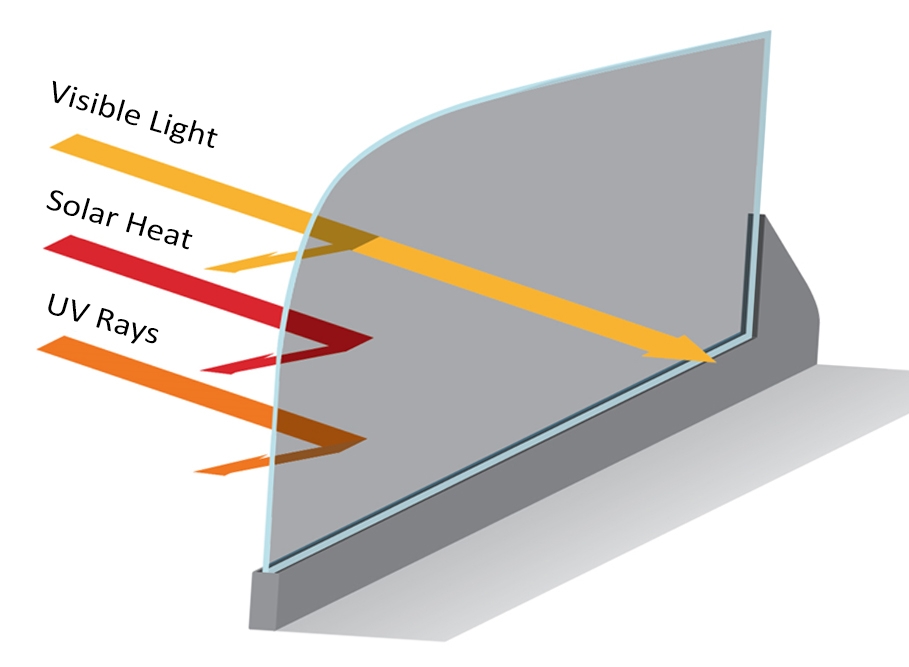
As you can see in the visual representation above, factory tint lets through visible light, solar heat, and UV rays; whereas, window film keeps out the solar heat and harmful UV rays.
Ultraviolet Rays
There are two types of ultraviolet rays; UVA and UVB.
UVB rays, simply put, are the cause of sunburn. Although UVB rays are more intense, especially during the summer months, they can’t penetrate through glass. So unless you have the windows down, you don’t have to worry about getting burnt in your car.
UVA rays are the ones you really have to worry about because they’re dangerous at all times of the year and can penetrate through glass. If your mother ever told you to put sunscreen on even when it’s cloudy out, she’s right. Accounting for up to 95% of UV radiation, UVA rays play a major role in skin cancer, aging, and wrinkles.
So why is all of this information important and what does it mean? Since studies suggest you will spend about 4 years of your life driving, it’s important to make sure that you’re aware of the potential damages of UV rays and how you can be affected.
The Skin Cancer Foundation recommends that, “since UVA penetrates glass, consider adding flat, tinted UV-protective film to your car’s side and rear windows as well as to house and business windows.” With 74% of all non-invasive melanoma skin cancer cases on the driver’s side of the body, it’s better to be safe than sorry.
Check out the protection performance of factory tint versus window film in the chart below.
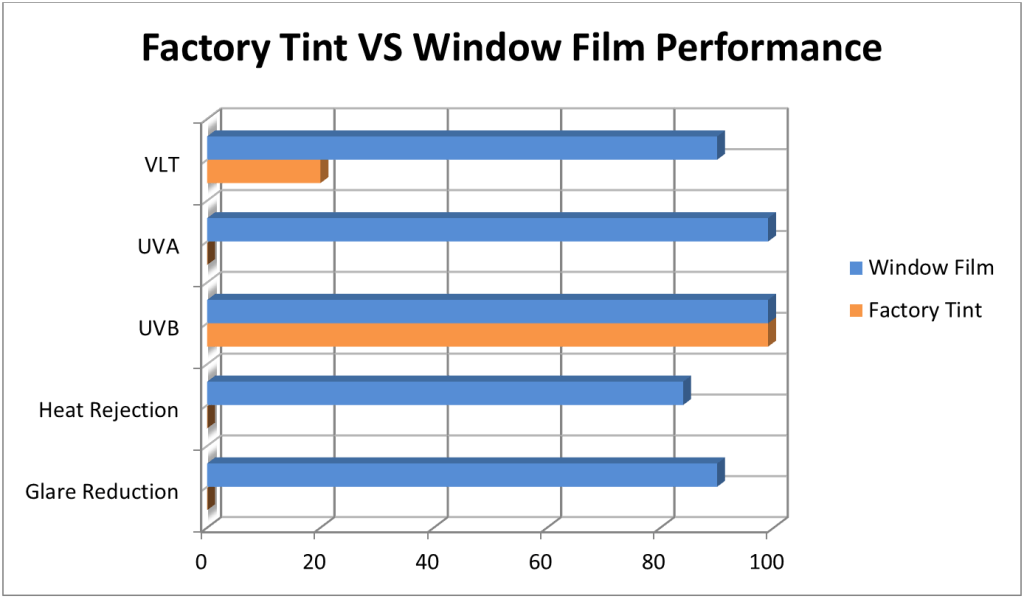
The chart above measures the differences in performance of privacy glass versus aftermarket window film.
“We get a lot of people in here that think they only need their front two windows tinted. When we explain the difference between factory tint and window film, most, if not all of our clients choose to get their entire vehicle tinted, usually with air blue 80 window film,” says Tim Cooke, COO of the Window Tinting division at Absolute Perfection.
There are different window films out there that provide UV filtration and heat rejection without making your windows too dark, but it’s important to ensure you’re protected from harmful UV rays.
Avoid the risks of skin aging, wrinkling, and cancer by researching your local tint shop to find out what films they offer and what will provide the best protection you and your family deserve.
